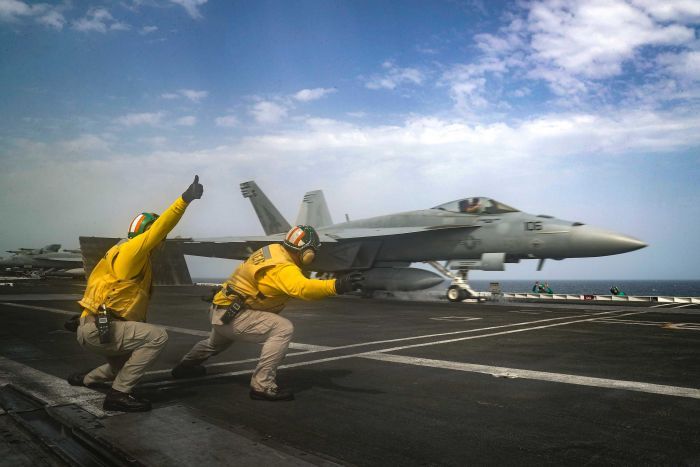
Commercial aircraft at risk of 'misidentification' by Iran military, US warns
Posted
United States diplomats have warned commercial airliners flying over the Persian Gulf risk being targeted by “miscalculation or misidentification” from the Iranian military amid heightened tensions between the Islamic Republic and the US, even as both Washington and Tehran say they do not seek war.
Key points:
- The diplomatic warning said commercial aircraft needed to be aware of Iran jets and weaponry
- The Persian Gulf is a major gateway for East-West air travel
- Iraqi officials say US-based ExxonMobil Corp have begun relocating staff from Basra
Though dismissed by Iran, the warning from the Federal Aviation Administration underscored the risks the current tensions pose to a region critical to both global air travel and trade.
Despite the warning, US officials have yet to publicly explain the threats they perceive coming from Iran, some two weeks after the White House ordered an aircraft carrier and B-52s bombers into the region.
The order relayed by diplomats in Kuwait and the UAE said all commercial aircraft flying over the waters of the Persian Gulf and the Gulf of Oman needed to be aware of Iran’s fighter jets and weaponry.
“Although Iran likely has no intention to target civil aircraft, the presence of multiple long-range, advanced anti-aircraft-capable weapons in a tense environment poses a possible risk of miscalculation or misidentification, especially during periods of heightened political tension and rhetoric,” the warning said.
It also said aircraft could experience interference with its navigation instruments and communications jamming “with little to no warning”.
The message comes 30 years after the USS Vincennes mistook an Iran Air commercial jetliner for an Iranian F-14, shooting it down and killing all 290 people onboard.
That was not lost on Iran’s mission to the United Nations, which dismissed the warning as America’s “psychological war against Iran”.

Photo:
The US has ordered an aircraft carrier and B-52 bombers into the region. (AP: Mass Communication Specialist 3rd Class Jeff Sherman, US Navy)
“There has never been a threat or risk to civilian air traffic in the Persian Gulf from Iran,” mission spokesman Alireza Miryousefi said.
“One cannot forget the fact that it was indeed a US warship that wantonly targeted an Iranian civilian passenger aircraft… the US has yet to apologise for that act of terrorism against Iranian civilians.”
The Persian Gulf has since become a major gateway for East-West travel in the aviation industry.
Dubai International Airport in the United Arab Emirates, home to Emirates airline, is the world’s busiest for international travel, while long-haul carriers Etihad and Qatar Airways also operate in the region.
Emirates, Etihad and Qatar Airways all said they were aware of the notice and their operations were unaffected. Oman Air did not respond to a request for comment.
Tensions date back to sanctions, nuclear deal withdrawal
The current tensions take root in US President Donald Trump’s decision last year to withdraw the US from the 2015 nuclear accord between Iran and world powers and impose wide-reaching sanctions.
Over the past week, oil tankers allegedly have faced sabotage and Yemen rebel drones attacked a crucial Saudi oil pipeline.
The US has ordered non-essential staff out of its diplomatic posts in Iraq and US-based oil company ExxonMobil Corp has also begun moving staff from Basra, according to Iraqi officials.
The island nation of Bahrain ordered its citizens out of Iraq and Iran over “the recent escalations and threats”.

Photo:
Two batches of ExxonMobil workers have left Basra amid rising tensions between Iran and the US. (AP: Nabil al-Jurani)
But Mr Trump has sought to soften his tone on Iran.
And Iranian Foreign Minister Mohammad Javad Zarif has also stressed Iran is “not seeking war”, comments seemingly contradicted by the head of the Revolutionary Guard, who declared an ongoing “intelligence war” between the nations.
Iran just announced it would begin backing away from terms of the deal, setting a 60-day deadline for Europe to come up with new terms or it would begin enriching uranium closer to weapons-grade levels.
Tehran long has insisted it does not seek nuclear weapons, though the West fears its program could allow it to build atomic bombs.
Speaking in China, where he finished a tour of Asian nations who rely on Mideast oil, Mr Zarif told the state-run IRNA news agency that war was not what Iran wanted.
“No war will occur as neither are we seeking a war nor anyone else has the illusion of being able to fight with Iran in the region,” he said.
The situation has not just prompted warnings about air traffic. Lloyd’s Market Association Joint War Committee added the Persian Gulf, the Gulf of Oman and the United Arab Emirates to its list of areas posing higher risk to insurers.
It also expanded its list to include the Saudi coast as a risk area.
AP
Topics:
